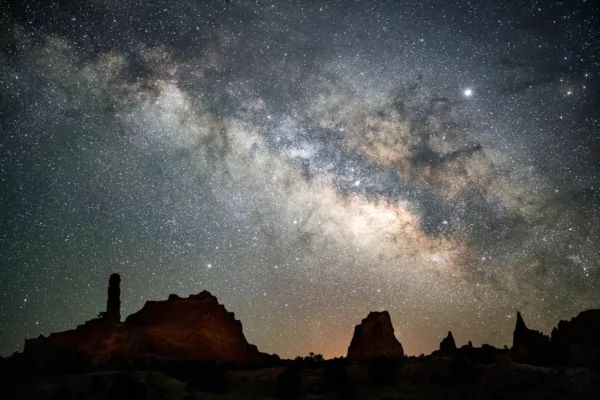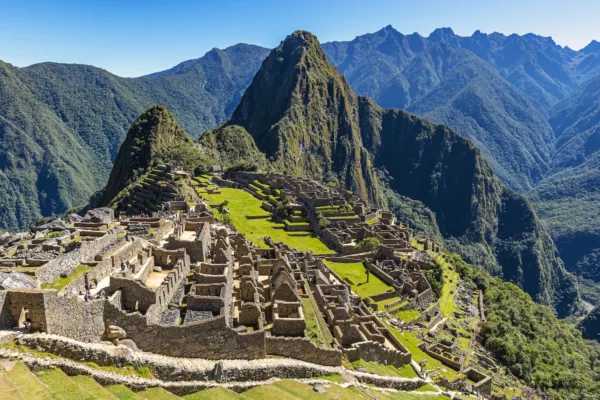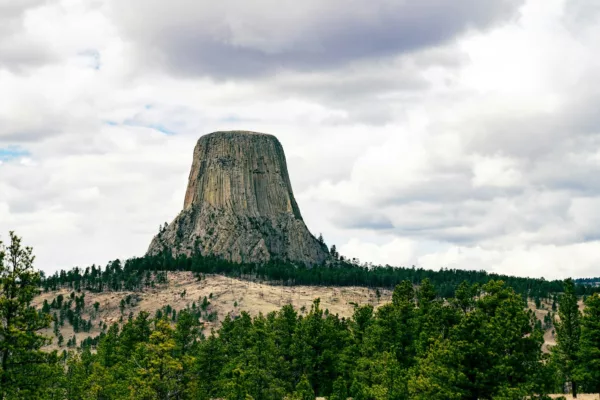The Way of the Wolf: Lands of Lost Borders, With Author Kate Harris
Combining autobiography, adventure, philosophy and history, Lands of Lost Borders chronicles a wild cycling journey along the fabled Silk Road.
The yearlong odyssey of author Kate Harris and her cycling pal Mel Yule draws back the curtain on a little-travelled area of the planet, giving us an intimate peek at life in countries like Kyrgyzstan, Azerbaijan and Tajikistan.
Inspired by explorers like Marco Polo and Fanny Bullock Workman, Harris grew up yearning to strike out on adventures of her own. Abandoning academia, she set her sights on intimately experiencing this formerly grand trade route now fallen silent behind restrictive borders.
Negotiating bureaucratic red tape in these countries is harder at times than climbing and descending the rough mountain roads of the route. At one point, the pair even snuck around an armed border checkpoint at night in order to gain access to the Tibetan Plateau.

Obsessed in her early life with someday going to Mars, Harris’s travels take us instead to a place that to many is almost as foreign, right here on Earth. Despite language and cultural barriers, no matter where their bikes took them they were lent a hand by most everyone they met. Families and individuals from all walks of life fed and housed the pair—again and again exhibiting decency and respect to these dusty, road weary strangers.
Fuelled by instant noodles and battling sickness, snowstorms, and endless flat tires Harris stays buoyant throughout. With outstanding insight, wit and humility, she reflects on borders and what they mean. Riding disguised in masks and with Chinese flags fluttering from their bikes to avoid detection by authorities in occupied Tibet, Harris muses that “Borders reinforce the idea of the alien, the Other, stories separate and distinct from ourselves.”
Lands of Lost Borders looks beyond these imaginary political boundaries meant to divide us. The book shows us that no matter how far off the beaten path you travel, people have far more in common than they do differences. It’s an uplifting realization that gives hope for the future of humankind.

Q&A with Author Kate Harris
What inspired you to cycle the Silk Road?
As a kid, I idolized Marco Polo based on the storybook version I knew of his travels. He seemed the epitome of an explorer to me: part adventurer, part mystic, ever-drawn to distant horizons. When I grew older, though, I was crushed to discover he was really a merchant at heart, motivated by profit margins more than a sense of curiosity about the world. He complained about the parts of the Silk Road that most compelled me, namely the mountains and deserts in between the fabled trading hubs. Polo wasn’t the only “explorer” I worshipped as a kid that let me down in this way: so many, upon closer examination, turned out to be the witting or unwitting servants of conquest and commerce, with devastating consequences for the people and places they “discovered.” So, I took to the Silk Road by bicycle in a spirit of defiance, hoping to salvage the art of exploration from the fame- and fortune-driven enterprise it had become, or perhaps has always been.
What was the hardest part of the journey?
Coming home and writing about it. Mel and I spent over a year total biking the Silk Road on two different trips. Writing a book about the journey took me half-a-decade. And while I love the exposure to new places and new people that you get by travelling by bicycle, I find there’s as much (or even more) intensity and thrill and a sense of discovery when I’m sitting back at my desk, trying to put those experiences to words. Words and the world go very much hand-in-hand for me: I travelled vicariously through books long before I had the chance to travel anywhere myself, so I wanted to write something worthy, I hope, of the books that galvanized me out the door in the first place.

Was there a singular highlight moment along the way?
Night-biking in Uzbekistan. Mel and I came to know stretches of that country more by its constellations than any terrestrial landmarks, because it was too hot and windy in the desert to bike by day, so we took to riding after dusk and before dawn, making out the road by the light of the moon. In a way, biking among the stars in Central Asia is the closest I’ve come to space travel—closer, even, than pretending to be on Mars during a simulated mission in Utah! Plus, I didn’t have to wear mock spacesuit on the Silk Road, meaning I could feel the wind on my face, breathe in the sage-scented air—I wouldn’t trade that for a new world any day.
What was the most dangerous part of the adventure?
Most people, upon hearing about our trip, think it was risky to sneak illegally across the Tibetan Plateau, or bike along the Afghan border for nearly a thousand kilometers. In truth, the greatest danger was far less glamorous: road traffic, particularly transport trucks, which have replaced the camel caravans of yore as means for shipping goods along the Silk Road.
Which person you encountered along the route left the biggest impression on you?
The pilgrims we caught up with while biking across the Tibetan Plateau. The man and woman had been prostrating themselves toward Lhasa for months, carrying nothing but the clothes they wore. We wobbled up to them on bikes loaded with a tent, food and clothes for all kinds of weather, and knew we’d met the real travellers, the real explorers. They took trust in the kindness and compassion of fellow humans, not to mention “travelling light,” to the most admirable extreme. We met them at a point in the trip when I was really despairing over the Chinese occupation of Tibet, and here they were, moving bravely through all the brokenness. Meeting was sort of like the final lines of Rilke’s “Archaic Torso of Apollo” poem: “There is no place that is not looking at you./ You will have to change your life.”

What was your favourite country en route?
I’d probably have to say Tajikistan. After biking across the Pamir Plateau there in the summertime during this Silk Road trip, I decided to go back in the winter for a ski trip. The goal was to ski after Marco Polo sheep in the borderlands, but my friends and I should’ve brought bikes, as there was hardly any snow that year! Ladakh in northern India is another region I’ll keep returning to again and again. Culturally, it’s more like Tibet than Tibet now, and it’s the sort of place that seems inexhaustible in terms of what it can teach you, or awaken in you.
You talk a lot in the book about your desire to go to Mars someday—is that still on your list?
Growing up in small-town Ontario exposed me to a pretty tamed, fenced, paved-over part of our planet, and it seemed a world diminished of possibilities compared to the one I read about in the accounts of early explorers. From what I could tell, Mars was the only place left in the solar system on which a person alive today could feasibly leave the first footprints. I was also entranced by the possibility that the red planet might harbour alien life, or at least ancient signs of it—incontrovertible proof that we’re not alone in the universe. “If it is just us,” as Carl Sagan notes, “seems like an awful waste of space.”
But having seen a bit more of our home planet now, I’m so in love with it—and equally so heartbroken by it—that I never want to leave. My loyalties are here. This living, breathing world is the best thing we’ve got going in the universe, plus we can’t actually live without it: do we need any other reason to take better care of it, and each other?

Any golden tidbit of advice for someone wanting to cycle all or part of your route?
Be equal parts bold and careful. Court wonder and absurdity with every pedal stroke. Above all, let yourself get sidetracked: straight lines are anathema to adventure.
What’s your next big adventure?
I wouldn’t turn down chance to ski traverse Ellesmere Island or trek in Bhutan, but my wanderlust these days has gone pretty local. I’m keen to better get to know my neighbourhood in Atlin, a small community on the border of British Columbia, Alaska, and the Yukon, where my partner and dog and I live off-grid in a one-room log cabin. With the Juneau Icefield, Atlin Lake itself, and mountains and rivers in all directions, I could spend lifetimes learning this land, its many seasons and weathers, its plants and animals, not to mention its deep Indigenous and more recent Gold Rush history. To live in a place where adventure is right out the back door—or the only door, in our tiny cabin’s case—is a deep and daily joy.

Discover More About Kate Harris:
Buy her book in stores across Canada or online.
Read Previous Blogs:
The Way of the Wolf: Imaginary Adventures
The Way of the Wolf: A Cabin in the Woods
The Way of the Wolf: How to Trek the Pacific Crest Trail, as told by through-hiker Rozanne Pilbeam














